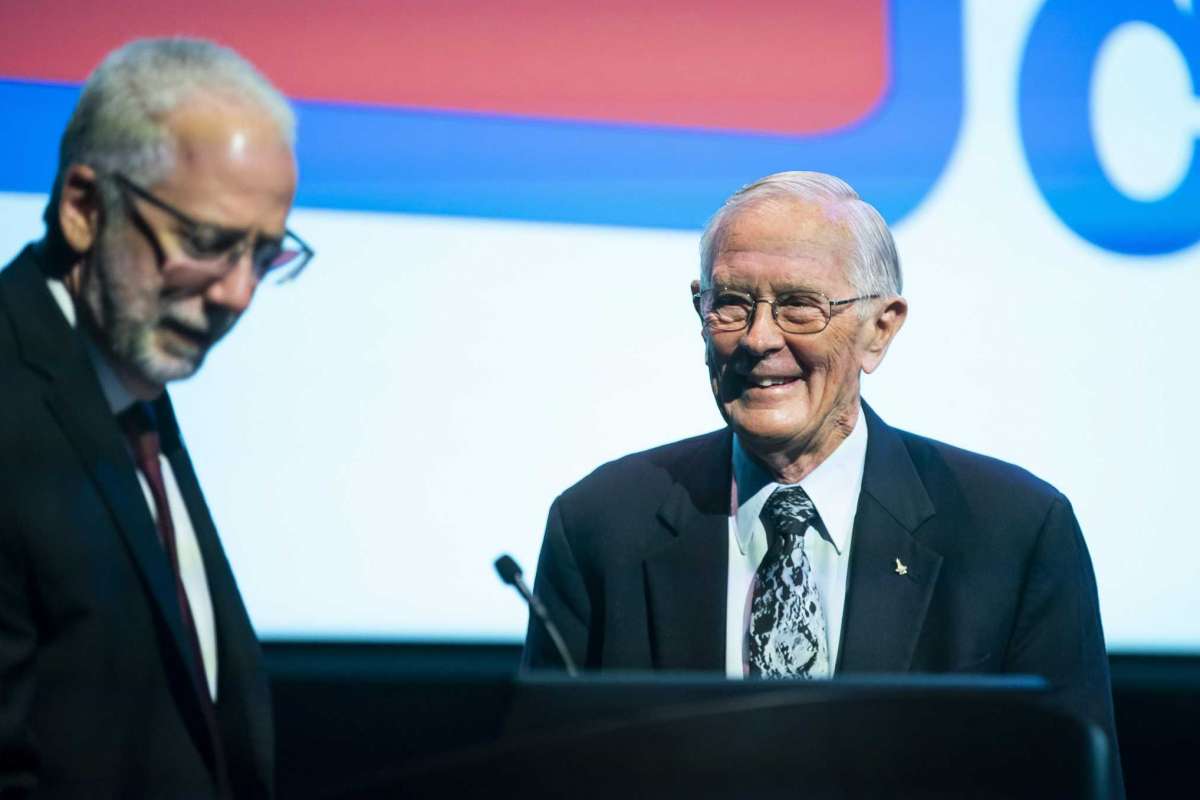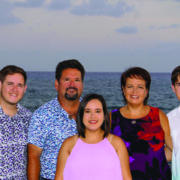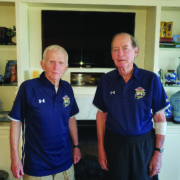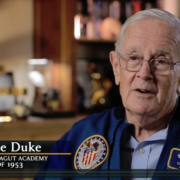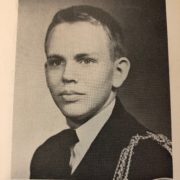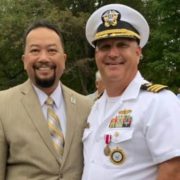Alumnus and Apollo 16 astronaut Charlie Duke ‘53S named 2020 Texan of the Year
Nearly 50 years after Charlie Duke became the youngest man to walk on the moon, the former astronaut was honored for his accomplishments in his adopted home state. Read the full article published in the Houston Chronicle.
Nearly 50 years after Charlie Duke became the youngest man to ever walk on the moon, the former astronaut was honored Tuesday for his accomplishments in his adopted home state.
Duke, who lives in New Braunfels and was a crew member on the Apollo 16 mission to the moon in April 1972, was named the 2020 Texan of the Year at Space Center Houston by the Texas Legislative Conference, a nonpartisan organization of Texas business and political leaders who meet annually to focus on public policy issues.
“It’s a unique award, unlike everything else that I’ve ever had,” Duke, 84, said. “I’ve gotten awards and honorary degrees, but it’s all for NASA. This is more than that, I sense. It’s representing Texas and a variety of accomplishments, more than just the space program.”
Duke will be honored March 26 at the New Braunfels Civic/Convention Center, joining an impressive group of Texan of the Year alumni that includes presidents, U.S. senators, entertainers, governors and business icons.
“General Duke is one of a mere dozen humans to have ever walked on the surface of the moon and looked back toward Earth,” said Ray Covey, chairman of the Texas Legislative Conference. “His perspectives are unique and his efforts have paved the way for tremendous advancements in science and technology that we all enjoy today.”
An Air Force fighter pilot — he eventually rose to the rank of brigadier general — Duke was one of 19 astronauts selected by NASA in April 1966. Three years after joining NASA, Duke was on the Mission Control room floor for the Apollo 11 lunar landing — at the request of Neil Armstrong, the commander and first man to walk on the moon — in charge of communicating with the astronauts from the ground at NASA’s Johnson Space Center in Houston.
When Armstrong and crew member Buzz Aldrin landed on the moon on July 20, 1969 — with Armstrong uttering the now famous phrase, “Houston, Tranquility Base here, the Eagle has landed” — Duke was there to answer the call.
Duke later served as lunar module pilot of Apollo 16 in April 1972. The fifth mission to land on the lunar surface, Apollo 16 focused on conducting science experiments and using the lunar rover. Duke and his commander, John Young, spent 20 hours exploring the surface.
Apollo 16 was the first scientific expedition to inspect, survey and sample materials and surface features in the Descartes region of the rugged lunar highlands. Duke also became the youngest astronaut to walk on the moon — by three months.
A South Carolina native, Duke has called Texas home since 1975. Duke retired from NASA in 1975, entering the private sector. He also served as chairman of the Astronaut Scholarship Foundation based in Florida.
He and his wife Dorothy co-authored the book “Moonwalker,” published by Olson Nelson Publishers in 1990. A U.S. Naval Academy graduate, Duke served as fighter interceptor pilot with the 526th Fighter Interceptor Squadron at Ramstein Air Base. He received his master’s degree from the Massachusetts Institute of Technology.
In his post-NASA career, Duke has dabbled as a motivational speaker and is also a strong advocate for an increased focus on science, technology, engineering, and math — STEM — education through Back to Space, a Dallas-based organization dedicated to making STEM “a focus in pop culture.”
Duke said that NASA’s revamping of its commercial space program has increased enthusiasm among college students he’s spoken to.
“I’m very excited about the commercial part of space with SpaceX and Boeing and Orbital, Blue Origin, they’re motivating a lot of kids (to say) ‘Hey I’d like to go to space,’” Duke said. “It’s our future and technology’s the future so we need to generate a lot more young people to get them studying that instead of stuff that’s not so technical.”
As a veteran moonwalker, Duke added he is pleased to see NASA focusing on returning to the lunar surface by 2024, which he has lobbied the agency to do for years, though he was realistic on the political difficulties in making that mission a reality.
“I think we can establish a permanent presence (on the Moon) as far as science and engineering goes, and shuttle crews back and forth, say, every couple of months, so I’m delighted to see NASA focusing back on the Moon,” Duke said. “I think we can do it in the (2020s). It’s not a technical problem in my view, it’s a money problem.”

